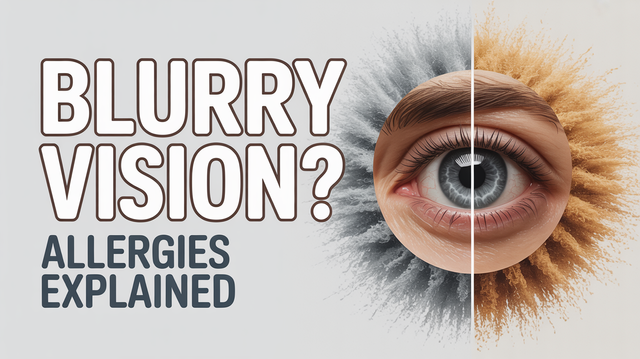Do Allergies Cause Blurry or Foggy Vision?
Has it ever been that way, your eyes get all fogged up or something, is this because of my allergies? You are not the only one. When the vision becomes cloudy out of a blue, many people often get confused and assume that moment is the allergy season. So now we are going to sit down and discuss this simply. Think your eye doctor friend answering questions and talking to you in a way you can understand, not all medical terms.
First, what actually happens when you have allergies?
When your body believes something as innocuous as pollen, dust, or pet dander is an enemy it responds as though it was under attack. The chemicals sent by the immune system to combat it off are histamines. The issue is, the same chemicals cause your eyes to itch, water, turn red and now and then become also blurred.
Now suppose you itch your eyes with your hands because they become itchy That compounds the matter. The surface of your eyes becomes irritated and tears begin to flow; your vision becomes blurred, as though you are looking through a muddy window.
Can allergies really make your eyesight blurry?
They can. But the good news is, this type of blurry vision is usually temporary. It happens because:
Your eyes produce too many tears
The surface of your eye gets swollen or irritated
Your eyelids puff up and block clear vision
Mucus buildup makes things cloudy
Think about when your glasses get smudged—it’s not that your eyes are broken, it’s just something covering your clear view. Allergies kind of do the same thing.
But wait, blurry vision can also mean other things
Here’s the important part. While allergies can cause blurry or foggy vision, it’s not the only reason. Sometimes blurry vision could mean you’re dealing with something more serious, like dry eye disease, an eye infection, or even early signs of conditions like keratoconus or cataracts.
That’s why if your blurry vision keeps coming back, doesn’t go away after allergy season, or gets worse, you should see an optometrist.
How to tell if it’s allergies or something else
Most people get set back at this point and blame the president and write it off as politics as usual but, that is just where most people stop thinking and in doing so they are closing the door of opportunity and by doing so they are simply going to be that much more stuck in the mud and that much more tied to the way, the method or the means by which they have always or used to do things before and in doing so we are simply robbing ourselves of the opportunity to become something better or do something different than before and therefore make something better than before and in doing so we are simply going to be that much more lost in Then, will give you a plain way of thinking on it:
Your eyes are itchy like you know what → it is highly likely that you have allergies
Eyes burn or gritty feeling in eyes --> may be dry eye
When your eyes water continuously → both allergies and dry eye can do that.
If the blur does not resolve with allergies => time to see an ophthalmologist.
It may be checked as follows at home:
Look away for a minute, use some artificial tears and check whether your vision improves. In case it is yes, then it was likely to be an allergic response or dry eyes. Otherwise, you do not have to wait long to visit the doctor.
So what can you do at home to help?
Alright, here’s the part everyone loves—tips you can actually use today.
Keep windows shut during allergy season so less pollen gets in.
Use a clean, cold washcloth on your eyes to calm down swelling.
Wash your face and hands after being outside (pollen sticks like glue).
Use preservative-free artificial tears to rinse allergens out.
Avoid rubbing your eyes, even though it feels soooo good (I know, tough).
If symptoms are bad, ask your doctor about antihistamine eye drops.
These little changes can make a big difference.
When should you worry?
Not to scare you, but here’s the truth. Blurry vision is not something you ignore for weeks and weeks. Go see a doctor if:
The blurry vision doesn’t go away after allergy season
Only one eye is affected
You also have pain, sudden flashes of light, or floaters
Your eyes feel really dry even when it’s not allergy time
Those are signs it’s more than just allergies.
Talking about foggy vision—what does it feel like?
Some people say it’s like a dirty contact lens. Others describe it as a cloud that won’t go away. It’s not sharp like double vision, it’s more like you’re looking through a mist.
If that sounds familiar, allergies could be the reason. But sometimes foggy vision can mean corneal swelling or other eye issues, which need professional care.
The bottom line
Yes, allergies can absolutely make your vision blurry or foggy. It happens to a lot of people, and most of the time it’s temporary. But don’t brush it off if it keeps happening or feels different from your usual allergy symptoms.
Your eyes are precious. Clear vision is not something you gamble with. If in doubt, get it checked.
